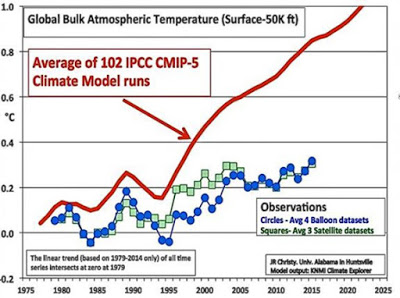

| Online: | |
| Visits: | |
| Stories: |
Four months to go
Monday, March 6, 2017 13:34
% of readers think this story is Fact. Add your two cents.
Prince Charles: 100 months to save the world
The Prince of Wales is to issue a stark warning that nations have “less than 100 months to act” to save the planet from irreversible damage due to climate change.
Gosh, we now have only four months left till doomsday. Are we worried? Is anyone worried? Was anyone ever worried? Worried enough to do something?
A key feature of the catastrophic climate narrative is how so many people in the public arena are induced to make predictions of doom. Alarming celebrity briefings must be distilled from scenarios created by climate models, but we have known for a long time that climate models cannot make long-term predictions of future climate states.
In sum, a strategy must recognise what is possible. In climate research and modelling, we should recognise that we are dealing with a coupled non-linear chaotic system, and therefore that the long-term prediction of future climate states is not possible.
IPCC Working Group I: The Scientific Basis, Third Assessment Report, Chapter 14.
In February 2016 climate scientist Dr. John Christy presented testimony to Congress demonstrating how climate models grossly exaggerate and overestimate the impact of atmospheric CO2 levels on global temperatures .
 |
| source |
This year Judith Curry produced a lay overview of climate models for the GWPF. Among many other criticisms she wrote.
There are valid concerns about a fundamental lack of predictability in the complex nonlinear climate system.
Yet Prince Charles must have been firmly convinced that his climate predictions were scientifically plausible, likely to happen and not liable to be derailed by that fundamental lack of predictability. As far as one can tell he remains convinced to this day.
Let us move on from Prince Charles to Thomas Kuhn. It’s a substantial jump but I’m sure we can cope.
To the extent, as significant as it is incomplete, that two scientific schools disagree about what is a problem and what a solution, they will inevitably talk through each other when debating the relative merits of their respective paradigms. In the partially circular arguments that regularly result, each paradigm will be shown to satisfy more or less the criteria that it dictates for itself and to fall short of a few of those dictated by its opponent. There are other reasons, too, for the incompleteness of logical contact that consistently characterizes paradigm debates. For example, since no paradigm ever solves all the problems it defines and since no two paradigms leave all the same problems unsolved, paradigm debates always involve the question: Which problems is it more significant to have solved? Like the issue of competing standards, that question of values can be answered only in terms of criteria that lie outside of normal science altogether, and it is that recourse to external criteria that most obviously makes paradigm debates revolutionary.
Thomas S. Kuhn - The Structure of Scientific Revolutions (1962)
If Kuhn was right, then perhaps we should ask a few questions based on criteria that lie outside of normal science altogether. Why did Prince Charles claim that we are doomed when the IPCC stated quite clearly that the long-term prediction of future climate states is not possible? He is not a celebrity poseur and does not appear to be virtue-signalling.
Who briefs him and with what object? Why does he still seem to believe that we are doomed? This is the kind of criterion we should focus on – the politics of manipulated behaviour.
Source: http://theylaughedatnoah.blogspot.com/2017/03/four-months-to-go.html



